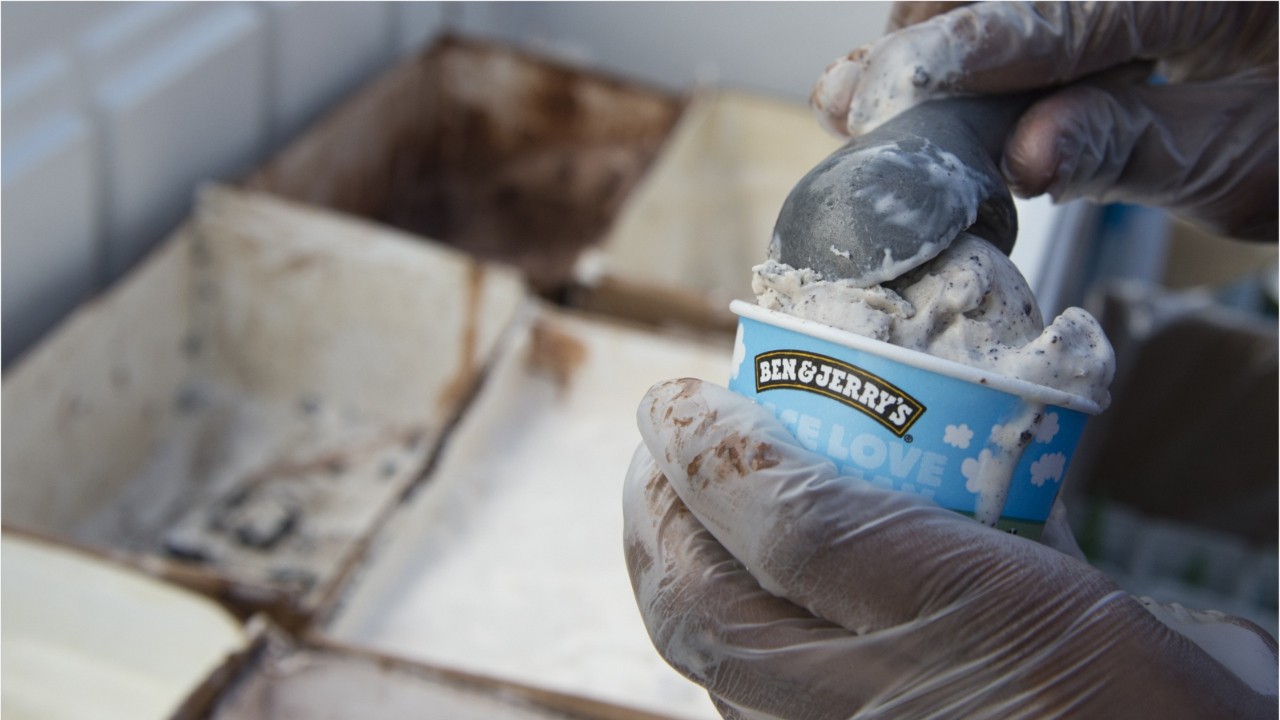Unilever to cut 7,500 jobs and split off ice cream division, including Ben & Jerry's
FILE - A pint of Unilever brand Ben & Jerrys ice cream arranged in Hastings-on-Hudson, New York, U.S., on Jan. 19, 2022. Photographer: Tiffany Hagler-Geard/Bloomberg via Getty Images
LONDON - Unilever, the company that makes Ben & Jerry’s ice cream and Magnum bars, announced on Tuesday that it is cutting 7,500 jobs worldwide and will spin off its ice cream business in an effort to reduce costs.
The consumer goods giant, which also makes Dove soaps and Vaseline, said its ice cream business has "distinct characteristics" from its other brands and would benefit from separate ownership to increase growth.
London-based Unilever said the split is expected to be completed by the end of 2025.
Meanwhile, the company is also launching a "productivity program" that is expected to lead to a reduction of about 7,500 mostly office-based jobs globally, or about 5.86% of its total workforce.
Unilever said it will invest in technology to find efficiencies and avoid duplication that it anticipates will help it save 800 million euros ($867 million) over the next three years. The company also laid off 1,500 staffers in early 2022.
"Simplifying our portfolio and driving greater productivity will allow us to further unlock the potential of this business, supporting our ambition to position Unilever as a world-leading consumer goods company delivering strong, sustainable growth and enhanced profitability," said CEO Hein Schumacher, who took the helm at Unilever last summer.
The company’s shares jumped more than 3% in late-morning trading on the London Stock Exchange.
"The share price bounce goes some way in reversing what has been a difficult last year, as investors have fretted over a company with limited high growth prospects and in need of streamlining despite its reputation as a solid defensive play," Richard Hunter, head of markets for interactive investor, an online investment service, told the Associated Press.
Unilever, also behind Hellman’s mayonnaise, Axe fragrances and Cif household cleaners, said it is targeting underlying sales growth of mid-single digits after spinning off the ice cream business.
It saw sales volume drop 3.6% in 2022 after jacking up prices 13.3% on average across its brands that year. In response, it raised prices just 2.8% last year, and sales rose 1.8%.
Splitting from Ben & Jerry’s could have added upside, analysts say

Ben & Jerry's sued over 'happy cows' claim
2019 video: Ice cream maker Ben and Jerry's was sued over the gimmick that its milk and cream ingredients come from happy cows.
Some analysts said that splitting from Ben & Jerry’s, a company known for social activism that has put it at odds at times with its corporate owner, could have an added upside for Unilever.
Ben & Jerry’s has supported liberal issues like LGBTQ+ rights, Black Lives Matter, justice for migrants and efforts to fight climate change.
RELATED: Ben & Jerry’s ends paid advertising on Twitter due to rise in ‘hate speech’
The brand announced in 2021 that it would stop selling its ice cream in the Israeli-occupied West Bank and contested east Jerusalem — territories sought by the Palestinians.
Unilever later announced that it was selling its business interest in Ben & Jerry’s in Israel to its Israeli licensee, which would market the products with Hebrew and Arabic labels. A U.S. judge rejected a lawsuit in 2022 from Ben & Jerry’s to block that plan.
More recently, since the Israel-Hamas war broke out, Ben & Jerry’s independent board chair Anuradha Mittal has called for a permanent ceasefire in Gaza.
"A side benefit of the brand exiting Unilever’s portfolio is it might quieten the ‘go woke and go broke’ noise, but more widely the reasoning for the decision looks pretty sound," Russ Mould, investment director at AJ Bell, a financial services company, told the Associated Press.
Mould noted that the ice cream spinoff had not been widely anticipated by the market even if "political pronouncements from Ben & Jerry’s had provoked a meltdown among some investors."
The Associated Press contributed to this report. It was reported from Cincinnati.

